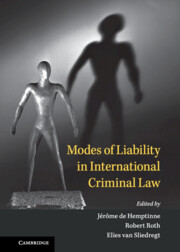Book contents
- Modes of Liability in International Criminal Law
- Modes of Liability in International Criminal Law
- Copyright page
- Contents
- Biographies
- Acknowledgements
- Abbreviations
- 1 Cross-Cutting Issues
- Part I Individual Commission
- Part II Joint Commission
- Part III Participation
- Part IV Participating in Group Activities
- Part V Inchoate and Preparatory Acts
- Part VI Other Forms of Responsibility
- Part VII Concluding Observations
- Index
1 - Cross-Cutting Issues
Published online by Cambridge University Press: 01 July 2019
- Modes of Liability in International Criminal Law
- Modes of Liability in International Criminal Law
- Copyright page
- Contents
- Biographies
- Acknowledgements
- Abbreviations
- 1 Cross-Cutting Issues
- Part I Individual Commission
- Part II Joint Commission
- Part III Participation
- Part IV Participating in Group Activities
- Part V Inchoate and Preparatory Acts
- Part VI Other Forms of Responsibility
- Part VII Concluding Observations
- Index
Summary
Presently, many of the debates and controversies in ICL concern modes of liability. Indeed, international jurisprudence is inconsistent in this area, as demonstrated by the numerous and high-profile debates surrounding the definition of the constitutive elements of direct co-perpetration,indirect co-perpetration,JCE,aiding and abetting,common purpose liability,conspiracy,incitementor superior responsibility.This situation has left the state of the law unclear, to the detriment of accountability and uniformity of ICL. While the constitutive elements of war crimes, crimes against humanity, genocide and aggression have been clarified in many studies, there is no contemporary comprehensive research that has addressed in detail all the different forms of responsibility for these international crimes.
- Type
- Chapter
- Information
- Modes of Liability in International Criminal Law , pp. 1 - 14Publisher: Cambridge University PressPrint publication year: 2019
- 1
- Cited by



